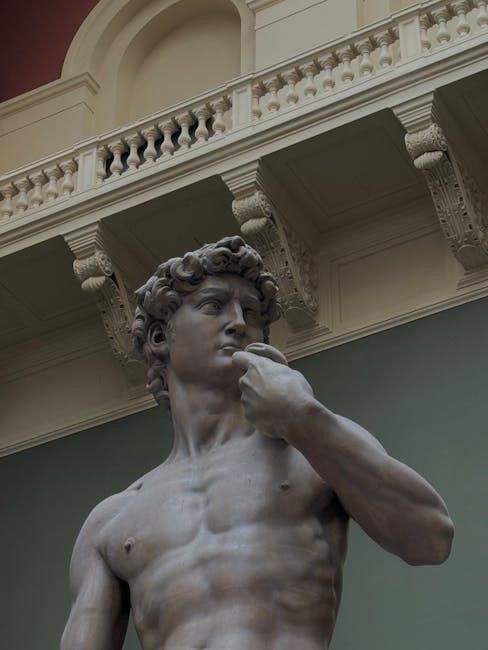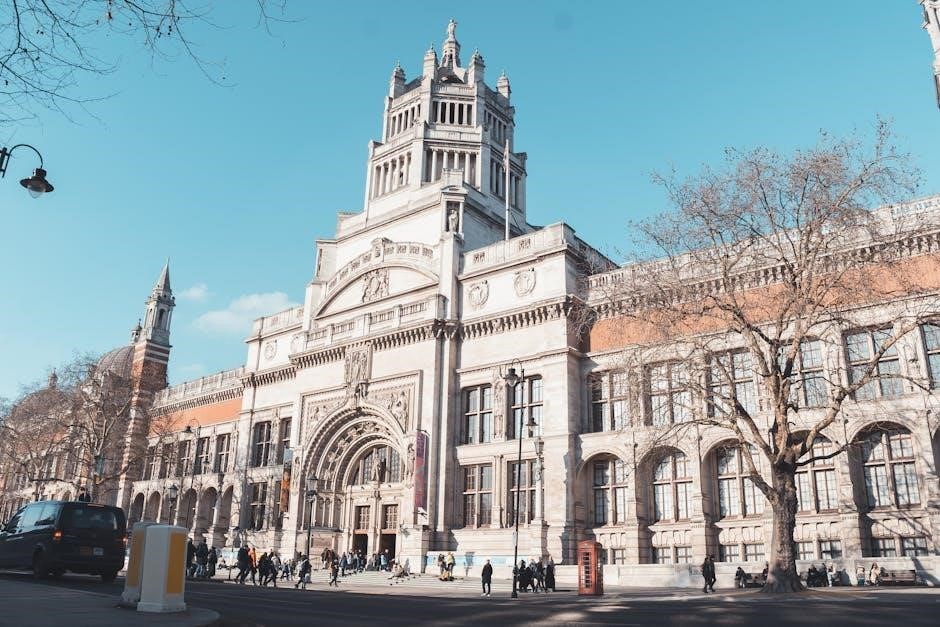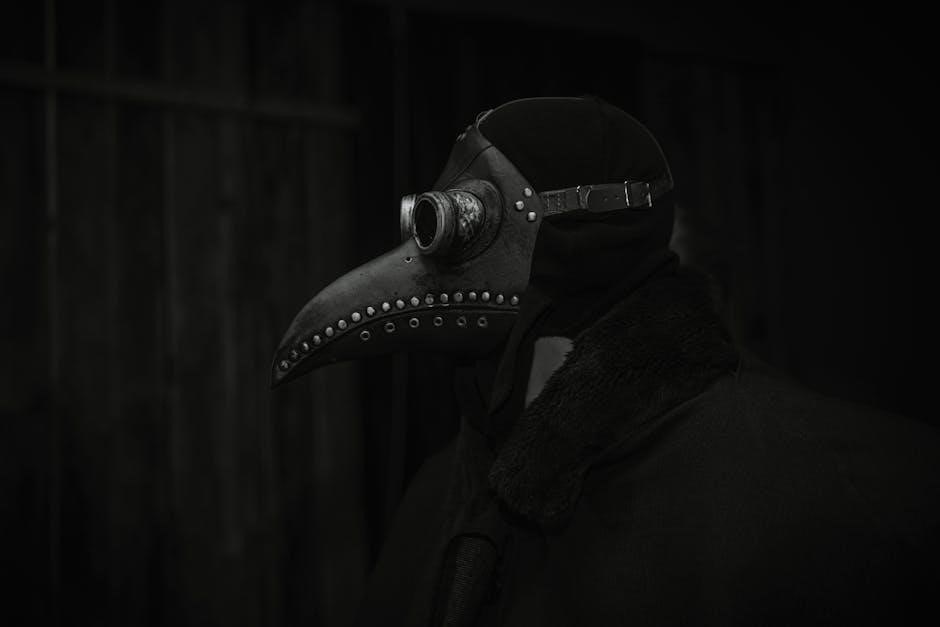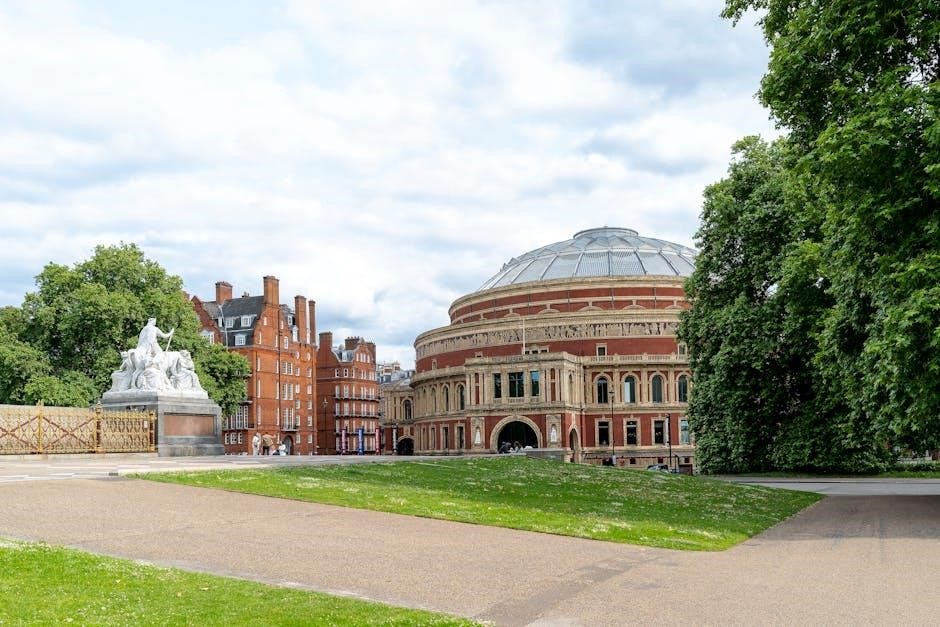Albert Camus’s The Plague‚ published in 1947‚ is a seminal absurdist novel exploring human resilience amid suffering‚ set in the Algerian city of Oran during a deadly epidemic.
1.1 Summary of the Novel
The Plague‚ set in the Algerian city of Oran‚ recounts a devastating epidemic that engulfs the town‚ forcing its inhabitants into isolation. The narrative‚ centered around Dr. Bernard Rieux‚ explores the community’s struggle to cope with the outbreak. As the plague spreads‚ societal norms collapse‚ revealing human resilience and despair. Camus crafts a gripping tale of collective suffering‚ using the epidemic as a metaphor for war‚ fascism‚ and existential absurdity. The novel delves into themes of freedom‚ morality‚ and the human condition amidst unparalleled crisis.

1.2 Background and Historical Context
The Plague was written by Albert Camus during World War II‚ reflecting his experiences under Nazi-occupied France. The novel mirrors the era’s isolation and collective suffering‚ using the plague as an allegory for fascism’s rise. Set in Oran‚ Algeria‚ the story draws on Camus’s North African roots‚ blending existential philosophy with historical relevance. Published in 1947‚ the book resonated deeply‚ capturing the post-war world’s trauma and solidarity‚ cementing Camus’s legacy as a literary giant and philosopher of the human condition.
Plot and Setting of “The Plague”
The story unfolds in Oran‚ Algeria‚ during the 1940s‚ where a mysterious plague outbreak devastates the city. The narrative begins with the sudden appearance of dying rats‚ signaling the onset of the epidemic. As the plague spreads‚ Oran is placed under quarantine‚ transforming it into a prison. The city’s isolation and the breakdown of societal norms highlight the absurdity of human existence. Through the lens of a coastal town’s struggle‚ Camus explores themes of confinement‚ solidarity‚ and the moral dilemmas of survival in the face of an uncontrollable catastrophe.
2.1 The City of Oran and Its Significance
The city of Oran‚ a French-Algerian port town‚ serves as the backdrop for the novel. Its isolation and lack of preparedness for the plague symbolize humanity’s vulnerability. Oran’s indifference to the initial signs of the outbreak reflects societal complacency‚ while its eventual quarantine mirrors the absurdity of human existence. The city’s transformation into a prison underscores themes of confinement and collective suffering‚ making Oran a central character in Camus’s exploration of resilience‚ solidarity‚ and the search for meaning amidst chaos.
2.2 The Outbreak of the Plague
The plague begins with the sudden appearance of dying rats in Oran‚ signaling the start of the epidemic. Initially‚ the townspeople are indifferent‚ dismissing the phenomenon as a minor nuisance. However‚ as the rats multiply and die in public spaces‚ panic slowly sets in. The government delays declaring a quarantine‚ further exacerbating the crisis. The rapid spread of the disease‚ coupled with the city’s unpreparedness‚ plunges Oran into chaos. The outbreak forces the community to confront the reality of death and suffering‚ reshaping their understanding of existence and solidarity.
2.3 The Quarantine and Its Impact
The quarantine transforms Oran into a prison‚ isolating its inhabitants from the outside world. Daily life grinds to a halt as fear and despair permeate the city. The absence of normalcy fosters a sense of collective suffering‚ yet also a quiet resilience among the survivors. Dr. Rieux and others work tirelessly to combat the disease‚ emphasizing humanity’s capacity for solidarity in the face of overwhelming adversity. The quarantine becomes a metaphor for the universal human condition‚ testing the limits of endurance and hope.
Major Themes in “The Plague”
The novel explores themes of absurdism‚ freedom‚ and collective suffering‚ using the plague as a metaphor for humanity’s struggle against universal adversity and existential despair.
3.1 The Plague as an Allegory for War and Fascism
The plague in Camus’s novel serves as a powerful allegory for war and fascism‚ reflecting the chaos‚ destruction‚ and collective suffering imposed by oppressive regimes. The outbreak mirrors the sudden‚ devastating impact of war‚ while the quarantine represents the isolation and helplessness felt under authoritarian rule. The citizens’ resistance and solidarity echo the European Resistance Movement during WWII‚ highlighting humanity’s resilience against oppression. Camus’s personal experiences during the Nazi occupation deeply influenced this allegorical portrayal‚ linking the plague’s horrors to the atrocities of fascism and war.
3.2 Freedom and Confinement
The Plague delves into the paradox of freedom and confinement‚ as the citizens of Oran face physical isolation yet struggle with existential questions of liberty. The quarantine enforces literal confinement‚ yet Camus explores how individuals find inner freedom through resilience and solidarity. The novel questions whether true freedom existed before the plague‚ suggesting that societal norms and routines can be more restrictive than physical barriers. This theme underscores Camus’s philosophy of absurdism‚ where individuals must create their own meaning amidst life’s confines.
3.3 Absurdism and the Meaning of Suffering
Camus’s The Plague embodies absurdist philosophy‚ exploring the inherent meaninglessness of suffering. The novel portrays a universe indifferent to human plight‚ with the plague symbolizing life’s unpredictability and cruelty. Characters like Dr. Rieux embody resilience‚ asserting dignity in the face of absurdity. Camus suggests that while suffering lacks inherent meaning‚ individuals can create purpose through solidarity and compassion. This paradox reflects Camus’s belief that humanity’s struggle against an indifferent world defines its existence.

Key Characters in “The Plague”
Dr. Bernard Rieux‚ Father Paneloux‚ and Jean Tarrou are central figures‚ each embodying distinct responses to the plague‚ from moral duty to religious zeal and existential reflection.

4.1 Dr. Bernard Rieux: The Moral Compass
Dr. Bernard Rieux is the protagonist and narrator of The Plague‚ a physician whose unwavering dedication to his patients embodies moral integrity. He remains in Oran to care for the afflicted‚ despite personal loss‚ showcasing selflessness and resilience. Rieux’s actions are guided by a deep sense of duty and compassion‚ rejecting ideological grandeur. His belief in fighting the plague‚ not as a hero but as a man doing his job‚ underscores his humility. Through Rieux‚ Camus highlights the importance of solidarity and quiet resistance in the face of absurdity and suffering.

4.2 Father Paneloux: The Voice of Religious Doctrine
Father Paneloux is a Catholic priest whose rigid adherence to religious doctrine contrasts sharply with Dr. Rieux’s humanist approach. He delivers sermons blaming the plague on the townspeople’s sins‚ advocating for repentance as the only solution. His unwavering belief in divine justice alienates many‚ yet his own death from the plague complicates his theology. Paneloux’s character represents the tension between religious dogma and human suffering‚ questioning the morality of viewing the plague as divine punishment while emphasizing the need for spiritual reflection amidst despair.
4.3 Jean Tarrou: The Outsider’s Perspective

Jean Tarrou is a mysterious outsider who arrives in Oran before the plague‚ bringing a unique perspective to the crisis. His past as a political activist and his rejection of violence add depth to his character. Tarrou forms a close bond with Dr. Rieux‚ sharing his philosophy of life and death. Through his diary entries‚ Tarrou reveals his inner thoughts on suffering and humanity‚ offering a reflective counterpoint to the chaos. His journey symbolizes the search for meaning and solidarity in the face of absurdity‚ making him a pivotal figure in the novel’s exploration of human resilience and moral responsibility.

Symbolic Interpretation of the Plague
The Plague is rich in symbolism‚ with the disease representing collective suffering‚ fascism‚ and existential absurdity. The rats signify impending doom‚ while the plague itself embodies societal injustice and human vulnerability‚ transcending literal meaning to explore deeper philosophical truths.
5.1 The Plague as a Symbol of Collective Suffering
The Plague serves as a powerful symbol of collective suffering‚ uniting the citizens of Oran in their shared experience of pain and loss. Camus uses the plague to illustrate how societal structures and individual lives are disrupted by forces beyond human control. The epidemic embodies universal human struggles‚ such as the inevitability of death and the fragility of life. Through this lens‚ the novel reflects on the interconnectedness of humanity and the resilience required to endure adversity‚ resonating with themes of solidarity and existential response to suffering. Camus’s portrayal highlights how collective hardship fosters unity and underscores the absurdity of human existence. The plague‚ as a symbol‚ transcends its literal meaning‚ becoming a metaphor for the shared burdens of humanity‚ particularly in the face of war‚ fascism‚ and societal collapse. By exploring the communal impact of the plague‚ Camus emphasizes the importance of empathy and collective action in overcoming adversity. This interpretation aligns with the novel’s broader philosophical themes‚ offering a profound commentary on human resilience and the search for meaning in the face of suffering. The plague‚ therefore‚ is not just a biological event but a mirror of societal and existential crises‚ inviting readers to reflect on their own responses to collective hardship. Through this symbolism‚ Camus underscores the enduring relevance of the novel’s themes‚ making it a timeless exploration of human struggle and solidarity. The plague’s symbolism extends beyond the fictional narrative‚ inviting readers to draw parallels with real-world events and their own experiences of collective suffering‚ such as pandemics‚ wars‚ and social injustices. Ultimately‚ the plague in Camus’s work is a reminder of humanity’s capacity for both despair and hope in the face of overwhelming adversity.
5.2 The Rats as Harbingers of Doom
The sudden appearance of dying rats in Oran marks the beginning of the plague‚ serving as an ominous warning of impending disaster. These rats‚ flooding the streets and homes‚ symbolize the unstoppable forces of death and decay. Their grotesque invasion disrupts the city’s normalcy‚ signaling the arrival of the plague and the collapse of social order. Camus uses the rats to foreshadow the inevitable suffering and to underscore the absurdity of a universe indifferent to human fate. The rats’ presence is a stark reminder of the fragility of life and the inevitability of death‚ aligning with the novel’s themes of existential despair and collective hardship. Their role as harbingers of doom underscores the futility of human attempts to control the uncontrollable‚ highlighting the absurdity of existence. The rats‚ therefore‚ are not just pests but symbols of the destructive forces that humanity cannot escape. Their infestation sets the stage for the plague’s devastating impact‚ illustrating how nature’s indifference can unravel human civilization. The rats’ significance lies in their ability to disrupt complacency‚ forcing the citizens of Oran to confront the reality of their mortality and the meaninglessness of their struggles against an indifferent universe. Through the rats‚ Camus emphasizes the inevitability of suffering and the futility of resistance‚ central themes in his absurdist philosophy.

Philosophical Concepts in “The Plague”
Camus explores absurdism‚ emphasizing humanity’s struggle against an indifferent universe. The novel reflects his belief in resilience and solidarity amidst suffering‚ rejecting existential despair and advocating for moral courage.
6.1 Camus’s Absurdist Philosophy
Camus’s absurdist philosophy‚ central to The Plague‚ explores humanity’s struggle against an indifferent universe. The novel embodies the absurd through the futile battle against the plague‚ highlighting the meaninglessness of suffering. Camus argues that while life lacks inherent purpose‚ individuals can find dignity in resilience and solidarity. Dr. Rieux’s unwavering commitment to his patients exemplifies this‚ illustrating that true meaning arises from ethical action‚ not divine purpose. The absurd is not just despair but a call to confront reality with courage and moral clarity.
6.2 Rebellion Against Suffering and Death
Camus’s The Plague underscores the futility of rebellion against suffering and death‚ yet emphasizes the inherent value of the act itself. The novel portrays the plague as an unstoppable force‚ symbolizing the inevitability of death and the absurdity of human resistance. However‚ Camus suggests that rebellion lies not in overcoming death but in confronting it with dignity‚ compassion‚ and solidarity. Dr. Rieux’s relentless efforts to save lives‚ despite the certainty of loss‚ embody this ethos‚ illustrating that true rebellion is found in affirming humanity amidst despair and existential futility.

Historical Context and WWII Influence
The Plague reflects Camus’s WWII experiences‚ with the outbreak mirroring the Nazi occupation. The novel serves as an allegory for resistance and solidarity against oppressive forces.
7.1 The Plague as a Reflection of WWII
Albert Camus drew heavily from his WWII experiences‚ crafting The Plague as an allegory for the Nazi occupation of France. The novel mirrors the invasion’s chaos‚ with the plague symbolizing the oppressive regime’s grip on society. Citizens of Oran‚ like occupied France‚ face isolation‚ fear‚ and the breakdown of normal life. The story underscores themes of collective resistance and solidarity‚ reflecting the resilience of communities under oppressive forces‚ while exploring the moral and emotional toll of living under tyranny.
7.2 Camus’s Personal Experiences and Their Impact
Albert Camus’s personal experiences deeply influenced The Plague. As a member of the French Resistance during WWII‚ he witnessed the horrors of war and occupation. These events shaped his portrayal of Oran’s struggle‚ infusing the novel with authenticity and emotional depth. Camus’s own moral compass and advocacy for human dignity are reflected in characters like Dr. Rieux‚ whose unwavering commitment to others mirrors Camus’s resistance work. His experiences with loss and injustice also informed the novel’s themes of absurdism and the search for meaning in suffering.
Reception and Legacy of the Novel
The Plague received widespread acclaim‚ earning Camus the Nobel Prize in 1957. Its timeless themes of resilience and solidarity resonate deeply‚ especially during global crises.

8.1 Critical Acclaim and Nobel Prize Recognition
Albert Camus’s The Plague garnered widespread critical acclaim for its profound exploration of human resilience and moral courage. Camus was awarded the Nobel Prize in Literature in 1957‚ with the novel playing a significant role in this recognition. Its universal themes of solidarity and defiance in the face of suffering resonated globally. The book’s ability to transcend time‚ offering insights into collective struggle‚ solidified its place as a literary masterpiece. Camus’s absurdist philosophy‚ intertwined with the narrative‚ further cemented his influence on 20th-century thought and literature.
8.2 The Plague’s Relevance in Modern Times
The Plague remains strikingly relevant in contemporary times‚ offering profound insights into human behavior during crises. Its depiction of isolation‚ fear‚ and collective suffering mirrors modern experiences‚ such as the COVID-19 pandemic. Camus’s exploration of solidarity‚ resilience‚ and moral responsibility continues to resonate‚ reminding us of the importance of unity in the face of adversity. The novel’s themes of absurdity and the search for meaning in suffering also speak to ongoing global challenges‚ ensuring its timeless appeal and universal significance.
Albert Camus’s The Plague is a profound exploration of human resilience‚ morality‚ and the absurd. Through its vivid portrayal of a city in crisis‚ the novel underscores the importance of solidarity and compassion in the face of suffering. Camus’s absurdist philosophy shines through‚ offering a timeless reflection on the meaning of life amidst chaos. The novel’s themes of collective struggle and individual responsibility remain universally relevant‚ making it a enduring masterpiece of 20th-century literature that continues to resonate with readers today.



